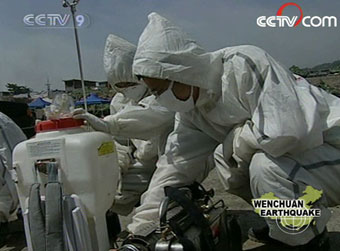Epidemic prevention is still a top priority in quake-affected areas. New high-tech equipment is being used to avoid any outbreak of disease.

Hanwang Town in Mianzhu is one of the worst-hit regions. The air force has sent two more vehicles with new equipment to ensure food and drinking water are safe.
In Mianzhu city, an air force epidemic prevention team is disinfecting a large section of the quake-stricken area.
Yang Yuanping, team leader of Air Force Epidemic Prevention, said, "We have 16 team members. Everyday we go out 16 times on average. We can disinfect about 50 to 60 square kilometers per day."
Hanwang Town in Mianzhu is one of the worst-hit regions. The air force has sent two more vehicles with new equipment to ensure food and drinking water are safe.
An epidemic prevention medic said, "This is a new sprayer. It sprays 90 to 200 liters of disinfectant per hour, and it can sterilize over 10 square kilometers an hour."
Epidemic prevention experts say the new equipment has made their work easier and more effective.
Methods of monitoring water quality have also been improved. Every day water sources in affected areas and army camps are tested to make sure the water is safe to drink.
In Mianyang, epidemic prevention is also being carried out in both densely populated areas and regions with scattered settlements.
In Maliuwan Village, Beichuan County, most villagers didn't leave their houses after the quake. Instead, they set up tents near their homes. The village is regularly sprayed with disinfectant and insecticide.
The villagers have also been given medication and educated on hygiene and proper sanitation.
Medics from the Mianyang Disease Prevention and Control Center say 11 epidemic prevention teams are operating in Leigu Town. Each team is assigned an area, to ensure the whole region is fully covered.
(CCTV June 5, 2008)